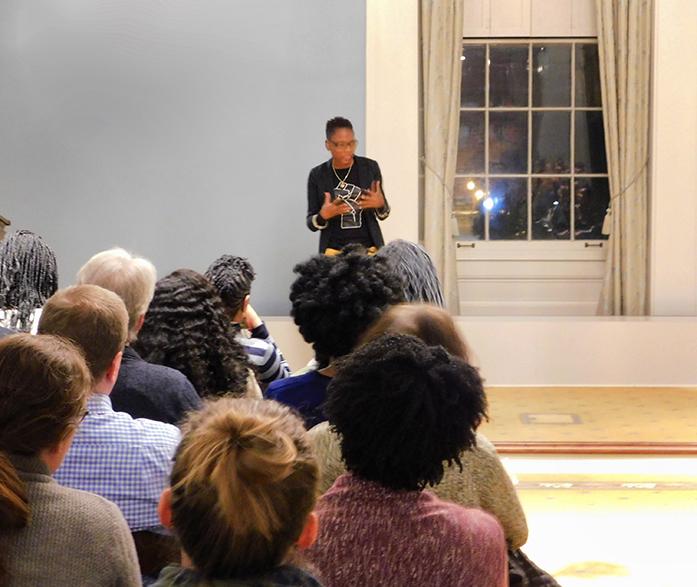Luvvie Ajayi discusses social justice and intolerance in a lecture greeted by much praise from students and faculty.
By Charles Peckman
The Old Capitol echoed with cries for social justice Wednesday evening.
Luvvie Ajayi, an experienced blogger and award-winning writer, presented the lecture “Speaking Truth to Power” as part of the University of Iowa Human Rights Week.
Tabitha Wiggins, the UI assistant director for equity & inclusion, said she was excited to have Ajayi speaking during Human Rights Week.
“A 12-year blogging veteran, she’s the voice behind the respected and hilarious AwesomelyLuvvie.com, where she covers all things pop culture with razor sharp commentary and wit,” Wiggins said.
Wiggins noted that Ajayi’s lecture is part of the week’s events, all of which help “keep [Martin Luther King, Jr.’s] words alive” in today’s world.
Ajayi started off by joking about her book. “I wanted to say something trite that will make you laugh,” she said.
The book, I’m Judging You: The Do-Better Manual, addresses numerous different topics, including racism. Her lecture focused on the seventh chapter, “Racism is for Assholes.” She said the chapter highlights the flaws of “a country that was built on the backs of black and brown people.”
The chapter was the most difficult to write, Ajayi said. There is definitive proof there is still a war against African Americans in the United States, she noted, so she struggled with writing what she felt was “enough” about the ongoing problem.
Ajayi said that throughout the presidential election, which was a perfect example of the hatred that still exists in the United States, she did not “underestimate the power of hate as a driver.”
There were many moments throughout the campaign that surprised her. What especially took her aback were the metrics by which the candidates were judged in the context of a “win” versus a “loss” in a presidential debate.
“Trump ‘won’ a debate because he didn’t yell?” she said. “What does that even mean?”
Ajayi said she was certain Trump would not win the presidency when the “grabbing video” was released.
Dismayed by the ultimate result, Ajayi said, “He won in spite of all of his failures.”
Ajayi said she was, once the voting demographics were released, shocked to discover that 53 percent of white women voted for Trump.
“What this shows to me is that white women don’t have a true sisterhood, and white women don’t trust themselves to lead,” she said.
Ajayi said it “blew her mind” that people could look at Hillary Clinton and still think Trump was a better option.
Ultimately, she said, her goal is not to preach a platform of “black supremacy.” She said there is a difference between those who talk about white power and those who talk about black power.
Ajayi said that those who speak about white power have done it historically “on the way to lynching one of my people.” To the contrary, black power comes from a place of empowerment and is said by people “who are hanging out and just having a good time.”
“Activism is not just about the people going to the [Women’s March on Washington],” she said. “It’s about doing things like having tough conversations across the dinner table.”
The end of Ajayi’s speech was met with thunderous applause. Jamal Nelson, a UI multicultural specialist in attendance, said it was nice to hear someone speak who is “unapologetically black.”
“She was very real and very open,” he said.



